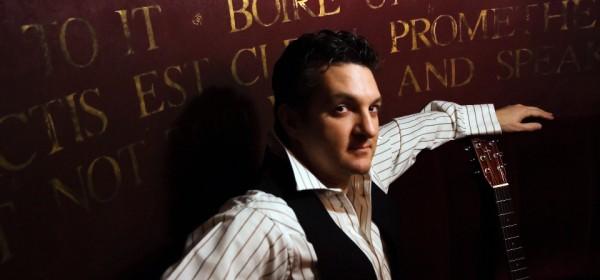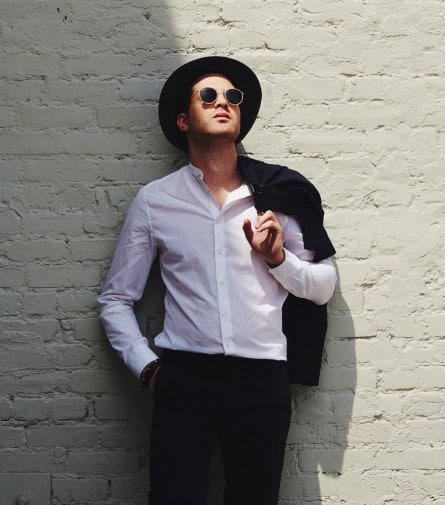Videos by American Songwriter
Canadian singer-songwriter Myk Gordon is riding high on the release of Set Free, which the Vancouver Sun calls “nothing short of a classic country-soul tour de force.” We talked to Gordon about touring, Aikido, and the tricky label “Americana.”
You launched your first national tour in June. How’s it going?
Amazing. I did my first show in Nashville with a killer band–and you could hear a pin drop during the quieter tunes! Getting ready to play the Living Room tonight in New York. It’s a beloved venue, and I’m really looking forward to playing a listening room that has hosted Ron Sexsmith, Norah Jones and others.
What do you attribute your current success to? Was having a record deal the key factor?
To paraphrase Bob Dylan, I’ve had a strong sense of destiny my whole life. I really had a sense early on of something greater at stake–personally, artistically–that transcended any self-imposed limitations, and work really hard to get out of the way of how that continues to manifest. I also continue to be blessed by remarkable people who love and support me. It’s about relationships, like anything in life. I’ve reached out for greatness in artists, musicians and producers, including Don Was, Tony Visconti, and now Steve Berlin (Los Lobos). It has reinforced my confidence, and raised my whole game considerably. Each step, success builds more energy and attraction your way. Friends and mentors like Billy Block in Nashville have been instrumental.
What made you want to start writing songs. How old were you? How long did it take you until you’d written a few you were proud of?
My folks lived in NYC in the ’60s and saw the likes of Odetta and Richie Havens. My dad was a jazz musician when he was young, and even sat in with Dave Brubeck. I remember completely immersing myself in the records we had: Jim Croce, Paul Simon, Stevie Wonder. A lot of Bach and baroque music also influenced my sense of composition. My older cousins had all these now classic records by Cat Stevens, Jesse Winchester, Carole King…and I think hearing Neil Young’s After the Goldrush single-handedly ignited the spark of possibility for me that one could create a kind of alchemy between introspection, observation and that kind of mythos of one’s place in time.
Is singer-songwriter music better received in Canada than the US?
We have an impressive legacy of songwriters from Canada, and there is tremendous grassroots appreciation and national pride in that. The best seem to resonate with the sense of expanse, yearning and even desolation that goes with the landscape. Many of us, however, continue to roam beyond the gate to pastures aplenty…
How do you feel about the label “Americana?” Has anyone ever called your music that?
Yes, though as a label of convenience it brings some split meaning. In its purest expression, American folk music is country, blues, bluegrass, which is just imprinted in the songwriter’s subconscious. Perhaps for those of us whom express those influences more frugally, it’s a good signpost. Ultimately, though, these labels only do point in a certain direction. The human mind really does struggle for singular definition in many things, as does marketing…
You’ve recently performed in Nashville. What’s your opinion of Music City?
I walked into a legendary venue and asked how much for the cover, and the lady responded in a classic southern twang: “I’m doing just fine, thank you…” Charming to a fault. I have felt completely welcomed there every time, such heart. The city just lives and breathes music and for a traveling songwriter it is like coming home in every way. Really inspiring.
It says on your American Songspace profile that you’re day jobs are “psychotherapist” and “Aikido teacher.” If this is true, how do these roles feed into your music and songwriting?
I hope it’s true! All three of these are expressions of what I strive for in my core values: honesty, authenticity, integrity. Psychotherapy and Aikido really help me learn by teaching others, primarily in the humility and respect that goes with being in that position of trust. When it comes to the audience, that same respect must be there, to really deliver as a writer and performer, to connect in the moment. All of this really comes back to having the courage to truly be yourself, something we all aspire to do. A kind of fearlessness and vulnerability that goes with struggling with and sharing that process…
Has being a member of American Songspace afforded you any opportunities?
Definitely, primarily in networking and exposure, and certainly in presenting me with continued opportunities. Kind of a virtual salt-lick for songwriters/publishers/artists, and that’s a compliment to cows.
Is writing songs hard for you or easy?
Leonard Cohen once said, paraphrasing again: “Poetry isn’t a job, it’s a verdict.” That’s about it. I agree with what songwriters like John Lennon or Townes Van Zandt said–that as an artist you are like a lightning rod. When creativity hits, it’s all you can do to get it out. And perhaps coherently as possible, I guess…[laughs]. So it’s a process of living life in anticipation of those moments, recognizing that–for me–it’s as much the ‘plateau’ effect of observing, internalizing and experiencing reality that makes contact through that lightning in a bottle. The best writers, in my mind, are shrewd editors. Poetry is merciless that way.
What’s the one song of yours you’d want people to hear the most, and why?
“What Does That Say.” Sometimes it all comes together right–lyrics, melody, emotion, story. I think this one comes across, certainly feels that way when I’m singing it, in terms of something honest emotionally and musically to my experience. If it comes close to that “personal becomes universal,” then I’ve done my job.
How important are lyrics in the grand scheme of things? Are there any criteria you weigh your own by?
They are the butter on the bread, man. Can’t have one without the other. If you look at a song as a corporeal body, the music is the muscular-skeletal structure upon which the meaning is expressed through what the French call the élan vital, which is to say the lifeblood. So it is a singular expression of the writer’s DNA; the potential of energy forms in a certain way that has to comply with the ‘rules’ of the whole system. But when you see a beautiful painting, it conveys the essence, form, emotion almost effortlessly but with exquisite craft. That really is the highest order to which I aspire–truth and beauty in seamless expression. If I can touch that even slightly, I will have touch greatness itself, which would be grand.














Leave a Reply
Only members can comment. Become a member. Already a member? Log in.